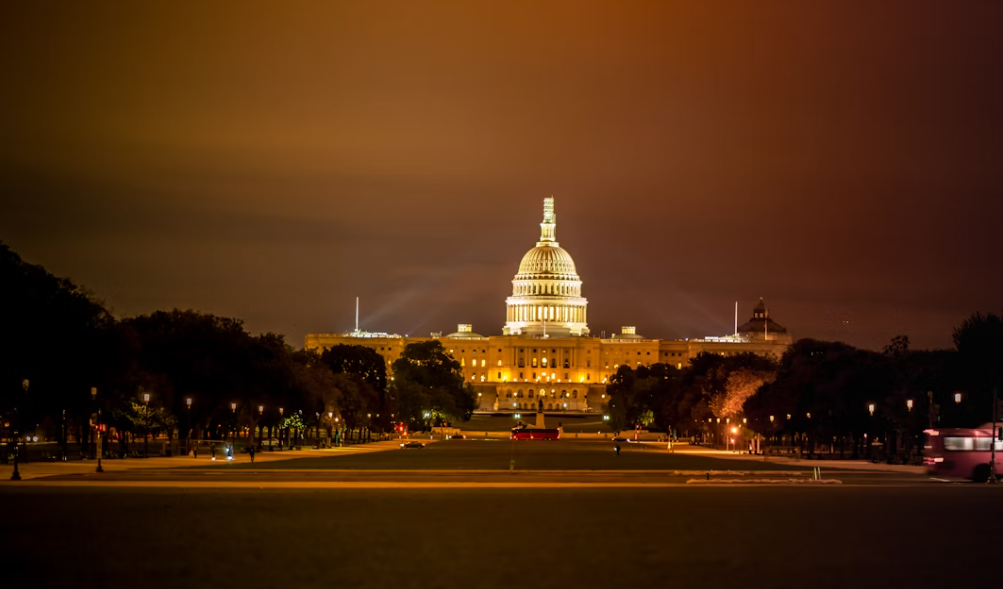




President Donald Trump called for the end of the Senate’s “blue slip” policy on Tuesday, renewing debate on the 108-year-old practice that grants senators a fundamental role in judicial confirmations for their home states.
Trump pressed for Senate Judiciary Committee chair Senator Chuck Grassley to break with the blue slip tradition in a Truth Social post on Tuesday, urging him to expedite a nomination process that has been slow-walked by an unprecedented Democratic blockade and has left the Senate wading through hours of roll-call votes to force through nominations.
“[Grassley] could solve the ‘blue slip’ problem we are having with respect to the appointment of Highly Qualified Judges and U.S. Attorneys, with a mere flick of the pen,” the president wrote. “[L]et our Great Republican Judges and U.S. Attorneys BE CONFIRMED. He should do this, IMMEDIATELY, and not let the Democrats laugh at him and the Republican Party for being weak and ineffective.”
The blue slip is a long-standing tradition in the Senate that gives home-state senators a significant say in the confirmation process for certain presidential nominees. When the president nominates someone to a federal judgeship or U.S. Attorney position in a particular state, the Senate Judiciary Committee sends a blue-colored form to the two senators from the nominee’s home state.
The home-state senators then either return the blue slip signed — indicating approval of the nominee — or withhold the slip, indicating a refusal to approve the nominee. This, historically, acted as an effective veto of the nominee. The blue policy as a whole, however, is not enshrined in Senate rules or law.
Trump’s call for Grassley to bypass the blue slip custom sparked debate on Wednesday regarding the practice.
“The blue slip is a long and cherished tradition. Both democratic presidents and republican presidents have asked us to get rid of it — we never have, and I hope we never will,” Republican Louisiana Sen. John Kennedy told reporters on Wednesday. “Senators are much better able to pick a lawyer from their community that satisfies what I call community standards. Presidents are more distant from the states. They don’t have that community knowledge, and I think it’s a very good thing for the Senate to have input.”
“I say this to the president: With respect, Mr. President, pretty please, with sugar on top, back off this, because I don’t think the Senate’s gonna’ go along, and I think it’s just a needless fight,” Kennedy said.
Republican Wisconsin Sen. Ron Johnson told reporters he disagrees with the president on the abolition of the blue slip courtesy. He described how the blue slip allows for nominations in split-party states, which would otherwise lead to what he called “political physics” — delayed retaliation — in the case of nominees pushed through regardless of the wishes of home-state senators.
“I just think that, again, it’s people in the president’s orbit advising him on policy, which on its face looks like a no-brainer. But the fact of the matter is, whoever advised him on that policy has no brain on this subject,” Johnson said.
The issue saw bipartisan support for the upholding of the blue slip precedent. Democrat Connecticut Sen. Richard Blumenthal agreed with his GOP counterparts on the need for continuing the use of blue slips in the nomination process, echoing the language of Senator Kennedy and the merit of “community standards.”
“President Trump makes a lot of comments about how the Senate should be run,” Blumenthal told reporters. “I think we have traditions in the Senate he may not like, but they tend to preserve the quality of local prosecutors and judges that preside in places that we represent, and we know who’s qualified in those places.”
“I just say to my Democrat colleagues: ‘You guys are driving this point. You say you all want to protect the Senate, but you’re grinding the Senate to a halt.’ We have to be able to function,” Hawley told the DCNF.
The blue slip process is not written into law, and it has not been followed unwaveringly in its history.
The evolving blue slip courtesy has led to a number of nominees being confirmed during the past two administrations despite the objections of home-state senators. These included the confirmations of circuit court judges David Stras, Kyle Duncan, and Andre Mathis from 2017-2022, all of whom were objected to by their respective home-state senators and were subsequently confirmed.
In 2017, Grassley released a written statement describing his attitude toward the blue slip process, illuminating an evolving view of the courtesy and establishing a stance that has diminished the power of home-state approval.
“The blue slip courtesy is just that — a courtesy,” Grassley wrote. “But some of my Democratic colleagues and left-wing outside groups mistakenly assert that the blue slip affords a home-state senator veto power over a nominee. That is not true.”
“I won’t allow the White House to just steamroll home-state senators. But, as I’ve said all along, I won’t allow the blue slip process to be abused,” Grassley wrote.
Trump’s backlog of almost 150 nominees awaiting confirmation has the Senate with in a tight spot as August draws near. The president’s call for suspension of blue slip courtesy may be the only way for the majority GOP to expedite the process and work through the list before the adjournment.
Content created by The Daily Caller News Foundation is available without charge to any eligible news publisher that can provide a large audience. For licensing opportunities of our original content, please contact licensing@dailycallernewsfoundation.org
